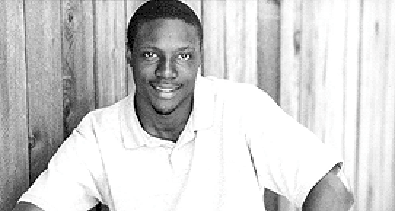
Rob Brown was only 15 years old when he landed his first movie--opposite Sean Connery, no less--as the title character in Gus Van Sant's Finding Forrester. His role as a gifted basketball player and writing prodigy who befriends a reclusive author came about only because the New York native needed extra cash. "I was trying to pay off a cell phone bill that was, like, $300," he recalls. "I got a flier in the mail about going to read for it and just went in. So I figured I'd go in for some extra work and ended up booking the lead role." Although he had never expressed an interest in acting before, his naturalistic performance garnered rave reviews. Now, Brown brings that same effortless ability to Coach Carter, in which he again plays a high school basketball player. Based on the true story of Ken Carter, a coach who dared to bench his undefeated players when their grades weren't up to snuff, the inspirational and entertaining film features a variety of young actors working alongside Samuel L. Jackson as Carter. Front and center is Brown as Kenyon Stone, an inner-city youth who struggles with his future while dealing with a pregnant girlfriend and dreams of college.
What's in a name: Although he made his acting debut against a luminary such as Connery, Brown says he was never intimidated by the actor's star power. "Once I realized I got the role, I said, 'I'm just going to do my best,' and didn't really feel that much pressure," he says. "Whatever I didn't know, they helped me with. I didn't really have any expectations or know what the process was about, so anything that came my way, I just took it all in." And Brown has nothing but raves for Jackson, who delivers another standout performance in Coach Carter. "He's the best, man," says Brown. "He's a real good guy and definitely likes to have fun. There was never a dull moment on the set."
Class act: After Forrester, one would assume Brown had a wide choice of roles, but the actor decided to concentrate on studying. "I don't recall a lot of offers coming my way," he says. "There were a few things here and there, including a TV thing I was looking at, but ultimately I chose to go back to school. I kind of took it as, 'This is a movie that I did, and it was something cool, but I'm going to go back to school.'" Now a sophomore at Amherst College, about to declare his major in psychology, Brown opted to take a semester off to shoot Coach Carter. Asked if he was being picky about his roles, he responds, "Absolutely. My team is real good, my representation. I probably don't even see a lot of scripts, because they already know it's not for me." But was it ever hard to turn down projects that offered him good money? Brown laughs. "I'm not at that point yet. Nothing comes across my table with huge money. I'm still paying dues," he says. "I guess I am picky, but I'd rather it be that way and throw away a movie that blows up than pick anything because of money." Although he's never taken a formal acting lesson, Brown does his work seriously. He says, "I'm not trained in the classical sense, but I have respect for the art, and I don't want to do something just to have something to do."
The good, the bad, and the wet: Asked what he doesn't like about acting, and Brown instantly responds, "For one thing, being spritzed down. I'm trying not to do any more sports movies for that reason." What he likes about it, however, is the end result. "I met all these people a year ago, and we worked on this film for four months," says Brown. "And, a year later, all the work we put in is finally being displayed. And it's a great feeling to know I worked on something so long and hard and can now send a message to so many people. That's the thrill of it for me. I had a part in entertaining people."
Back at school and waiting to see what his next project will be, Brown remains philosophical about the acting game. He says, "I know I'm not going to book everything I go in on, and that's just the nature of the business. You have to keep hustling and not get down on it. You have to keep at it and find your way in. Everybody's story is different. People come up to me and say, 'How do you break into the game?' I didn't know how to answer that. After working on this film, the answer I would give now is, 'You've got to find your own way.' Everybody has their own story, and you have to find your own way to buckle down and do it."